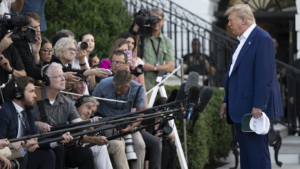The ninth anniversary of the Sept. 11 attacks is tomorrow, and a study shows that Americans will tolerate government secrecy about terror plots, but only in certain circumstances.
The study, which was led by professor V. Kerry Smith of the W. P. Carey School of Business at Arizona State University, surveyed more than 2,000 Americans about their beliefs concerning government secrecy about terrorism. The study, also conducted by Carol Mansfeld and H. Allen Klaiber, included results from an Internet panel run by Knowledge Networks.
“The reason we were interested in doing (this survey) is there’s a presumption that security requires a certain amount of secrecy,” Smith said. The survey was aimed at determining in which situations Americans will tolerate secrecy from the government in return for the promise of safety, he said.
Survey participants were asked to determine whether the government should release or withhold information regarding terrorist plots in three different situations. The questions were asked with the caveat that if the information was released, it could increase the possibility of terrorist threat.
In two situations, a threat to disrupt Internet service at local banks, which would disrupt the processing of credit and debit card sales in the U.S. for 48 hours, and a threat to destroy major airports in Los Angeles and New York, participants responded similarly.
More than 75 percent of participants said they would want the government to withhold information rather than give away any knowledge that would make it more difficult to uncover future plots or give terrorists an upper hand.
However, when asked about the government releasing information about the true nature of a plane crash due to a terrorist attack, more than 80 percent of those surveyed said they would want the government to release this information.
“What was the surprise to me and others was the very dramatic differences” in the types of information that Americans would agree to have withheld, Smith said.
Smith says most Americans don’t perceive all threats as being the same, which means that the government shouldn’t think that Americans’ tolerance to secrecy is uniform for all threats.
He suggests a reason why Americans are more sensitive to the threat of an attack on a commercial airplane is that what happens during a plane flight isn’t something they can control, whereas the other situations that can be more easily controlled. This reasoning comes from results of risk assessment surveys, not done during this survey.
Risk assessment surveys also offer an explanation as to why women and people living in married households were more willing to support the withholding of information, and people with college degrees were more likely to support the release of information. These definable characteristics of people, gender, marital status or education, can be used to track trends in the way people assess risk and make decisions.
Smith also said survey results don’t change based on whether Americans are confronted with terrorism at the time of the survey or not.
The first leg of the survey, which polled about 1,900 people in 33 major cities in December 2009, was bracketed by the Christmas shoe bomber’s attempt to blow up a commercial plane, Smith said.
Some of the participants took the survey before the attempt, some after, some even lived in Detroit, the plane’s destination, he said. However, the results of the survey weren’t affected, Smith said.
The second part of the survey, which polled about 500 people in four major cities in April 2010, showed the same results as the December 2009 portion of the survey.
The U.S. Department of Homeland Security through the Center for Risk and Economic Analysis of Terrorism Events supported the research for this survey.
- Three scenarios summarized and the survey responses:
“Should the government release the details of a major plot to destroy airports in Los Angeles and New York after the terrorists have been captured, even though it might give away the techniques law enforcement used and make it harder to uncover future plots?”
Information Released – 23 percent; Information withheld – 77 percent
“Should the government announce the details of a major terrorist plot to disrupt Internet service at commercial banks, and prevent the processing of credit and debit card sales across the United States for 48 hours, if the terrorists have been captured, even though it would give away the techniques used to identify the suspects and reveal specifics of the security network?”
Information Released – 24 percent; Information withheld – 76 percent
“Should the government release the true cause of an airplane crash due to a terrorist attack, even if that will have major economic effects on commercial airlines, give the terrorists notoriety and create an increased fear of flying?”
Information Released – 83 percent; Information withheld – 17 percent




